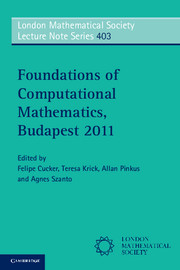Book contents
- Frontmatter
- Contents
- Preface
- Contributors
- 1 The State of the Art in Smale's 7th Problem
- 2 The Shape of Data
- 3 Upwinding in Finite Element Systems of Differential Forms
- 4 On the Complexity of Computing Quadrature Formulas for SDEs
- 5 The Quantum Walk of F. Riesz
- 6 Modulated Fourier Expansions for Continuous and Discrete Oscillatory Systems
- 7 The Dual Role of Convection in 3D Navier-Stokes Equations
- 8 Algebraic and Differential Invariants
- 9 Through the Kaleidoscope: Symmetries, Groups and Chebyshev-Approximations from a Computational Point of View
- 10 Sage: Creating a Viable Free Open Source Alternative to Magma, Maple, Mathematica, and MATLAB
10 - Sage: Creating a Viable Free Open Source Alternative to Magma, Maple, Mathematica, and MATLAB
Published online by Cambridge University Press: 05 December 2012
- Frontmatter
- Contents
- Preface
- Contributors
- 1 The State of the Art in Smale's 7th Problem
- 2 The Shape of Data
- 3 Upwinding in Finite Element Systems of Differential Forms
- 4 On the Complexity of Computing Quadrature Formulas for SDEs
- 5 The Quantum Walk of F. Riesz
- 6 Modulated Fourier Expansions for Continuous and Discrete Oscillatory Systems
- 7 The Dual Role of Convection in 3D Navier-Stokes Equations
- 8 Algebraic and Differential Invariants
- 9 Through the Kaleidoscope: Symmetries, Groups and Chebyshev-Approximations from a Computational Point of View
- 10 Sage: Creating a Viable Free Open Source Alternative to Magma, Maple, Mathematica, and MATLAB
Summary
Abstract
Sage is a large free open source software package aimed at all areas of mathematical computation. Hundreds of people have contributed to the project, which has steadily grown in popularity since 2005. This paper describes the motivation for starting Sage and the history of the project.
Introduction
The goal of the Sage project (http://www.sagemath.org) is to create a viable free open source alternative to Magma, Maple™, Mathematica®, and MATLAB®, which are the most popular non-free closed source mathematical software systems. Magma is (by far) the most advanced non-free system for structured abstract algebraic computation, Mathematica and Maple are popular and highly developed systems that shine at symbolic manipulation, and MATLAB is the most popular system for applied numerical mathematics. Together there are over 3,000 employees working at the companies that produce the four Ma's listed above, which take in over a hundred million dollars of revenue annually.
By a viable free alternative to the Ma's, we mean a system that will have the important mathematical features of each Ma, with comparable speed. It will have 2d and 3d graphics, an interactive graphical user interface, and documentation, including books, papers, school and college curriculum materials, etc. A single alternative to all of the Ma's is not necessarily a drop-in replacement for any of the Ma's; in particular, it need not run programs written in the custom languages of those systems. Thus an alternative may be philosophically different than the open source system Octave, which understands the MATLAB source language and attempts to implement the entire MATLAB library.
- Type
- Chapter
- Information
- Foundations of Computational Mathematics, Budapest 2011 , pp. 230 - 238Publisher: Cambridge University PressPrint publication year: 2012
- 4
- Cited by

